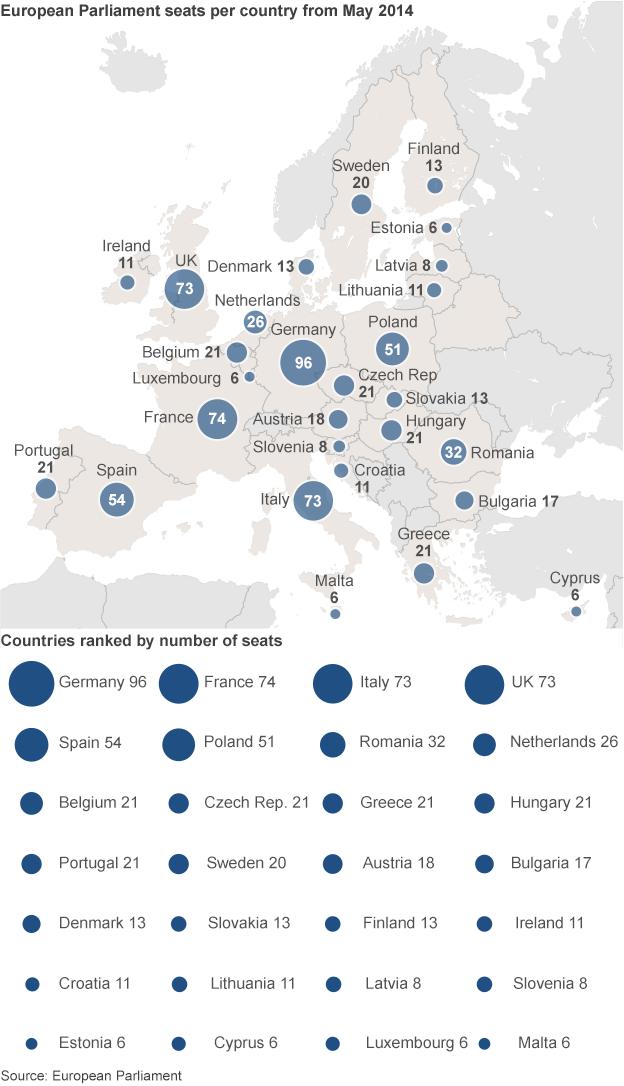Q&A: Election for the European Parliament
- Published
From 22-25 May, all 28 member states of the European Union held elections for the European Parliament. Here's a guide:
Who is being elected?
Some 751 members of the European Parliament, known as MEPs will be elected.
The number of MEPs will rise this year from the 736 elected at the last election in 2009.
This is to reflect Europe's growing population, and the addition of a new member state - Croatia - which joined in 2013.

How many MEPs does each country have?
This is decided by the country's population.
Germany, Europe's most populous nation, has 96 MEPs while Malta, Estonia, Cyprus and Luxembourg have six each.


How are MEPs elected?
Proportional Representation (PR) is used to determine how many MEPs each national party has, based on the share of the vote it wins.
A mathematical formula known as D'Hondt is used to calculate each party's seats.
The form of PR used also varies.
In some countries voters can pick one or more named candidates. This is known as an "open list", and is used in 16 states including Austria, Belgium, Italy, Poland and Sweden.
Elsewhere, voters choose a party, and the party decides the order in which their candidates are elected. This is known as a 'closed list' and is used in eight countries including France, Germany and the UK (except Northern Ireland, which uses the Single Transferable Vote system).
PR is seen as benefitting smaller parties, compared with first-past-the-post system used in UK general elections.

What powers do MEPs have?
MEPs negotiate legislation with national government ministers - the Council - in what is called "co-decision", then parliament votes on the laws.
They also have an important say in big budget areas, such as agriculture and regional aid.
MEPs can press the European Commission to legislate on particular issues. They can also act on issues raised by voters who petition them directly. That was notably the case in the EU fisheries reform, where public pressure made a big impact.
Their consent is also required for EU trade agreements with non-EU countries, and for admitting new states.
Since 2009 MEP's powers have expanded considerably, under the Lisbon Treaty.

What are the 'groups' in the parliament?
Voters elect MEPs from their own national parties, but once elected they usually join EU-wide groups with similarly-minded parties from other countries.
There were seven political groups in the parliament from 2009-2014, plus a 'group' of non-attached MEPs.
In this election, the BBC will describe them as follows:
•EPP (European People's Party) - centre-right, supports greater EU integration
•Socialist (Progressive Alliance of Socialists and Democrats) - Main centre-left group
•Liberal (Alliance of Liberals and Democrats for Europe) - Centrist group, very pro-integration
•Green (European Greens/European Free Alliance) - Alliance of parties representing regional interest, and green parties
•Conservative (European Conservatives and Reformists) - Founded after the 2009 election, this group seeks reform of the European Union
•EFD (Europe of Freedom and Democracy) - Right-wing group broadly opposed to further European integration
•Left (European United Left) - Far left group, containing traditional communist and socialist parties
•Other (No Group or "Non-inscrits") - MEPs who have been rejected by other groups or unable to form their own

How is the election organised?
The election takes place over four days, with groups of countries voting on different days.
British voters went to the polls on 22 May - the same day as local elections in 161 English councils, 11 councils in Northern Ireland, and five mayoral elections.
Initial results in the European election are expected from 2100 GMT on Sunday 25 May.
Northern Ireland's result is declared on Monday 26 May.

How will results be reported?
Results for the UK will be counted by local authorities.
Results will appear initially as the number of votes received by each party as each local council in each region declares.
The MEPs elected for each region will be announced once the number of seats each party has won has been calculated using the D'Hondt formula.
Northern Ireland uses the Single Transferable Vote system to elect its 3 MEPs. Results from Northern Ireland are expected on Monday 26 May.
The BBC will report initial results for groups in the European Parliament based on exit poll projections.
These projections are used by most leading European news networks.
There may be some minor variations between projected results and official figures published by the European Parliament website.